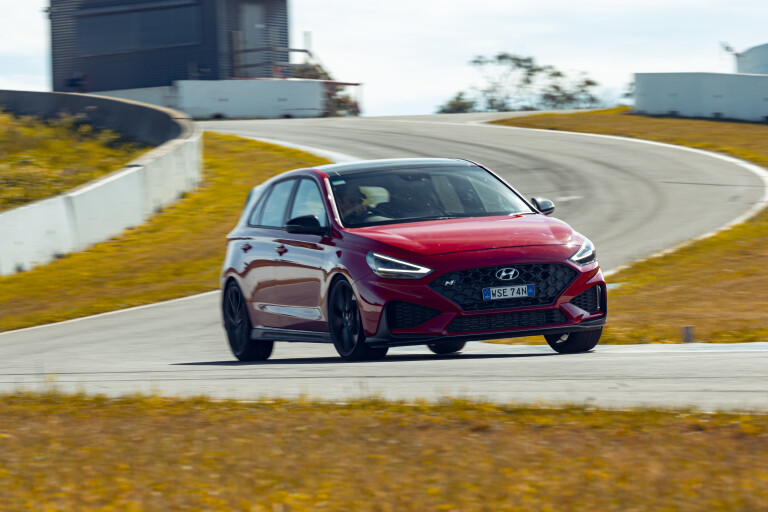
We’ve loved it on the road and it’s reset front-wheel drive records on the drag strip, but how does the new Hyundai i30 N DCT stack up on track?
To find out, we have a day at Bryant Park and a DriftBox with which to record the data. It’s the first front-wheel-drive car we’ve run in MOTOR’s new track series and it’ll be interesting to see if it can do any giant-killing as Bryant Park tends to be a natural hot hatch habitat.
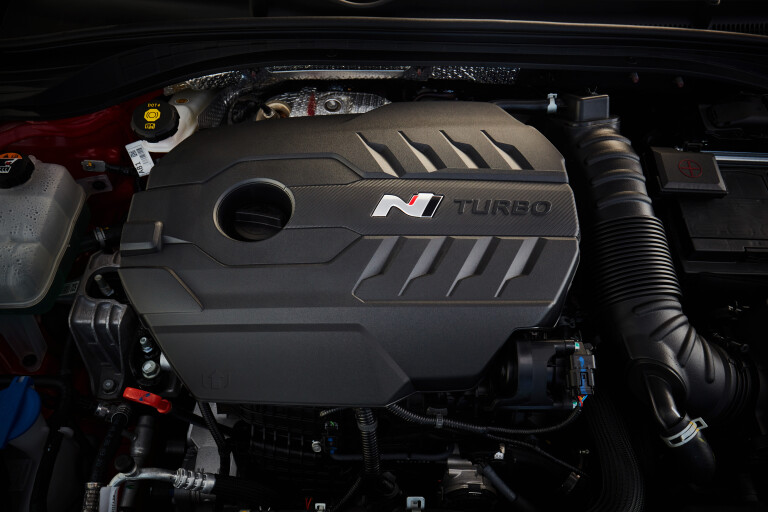
You’re probably familiar with the new i30 N’s specs so let’s be brief: an extra 4kW/39Nm from the 2.0-litre turbo four-pot, an eight-speed dual-clutch gearbox, bigger front brake rotors, lighter wheels and retuned suspension. All things that bode well for increased track performance.
First things first, the uprated engine is incredibly strong, way stronger than the relatively mild increased outputs suggest. The torque jump is carried right across the rev range and the new i30 N will pin your head back into the seat in the lower gears under acceleration.
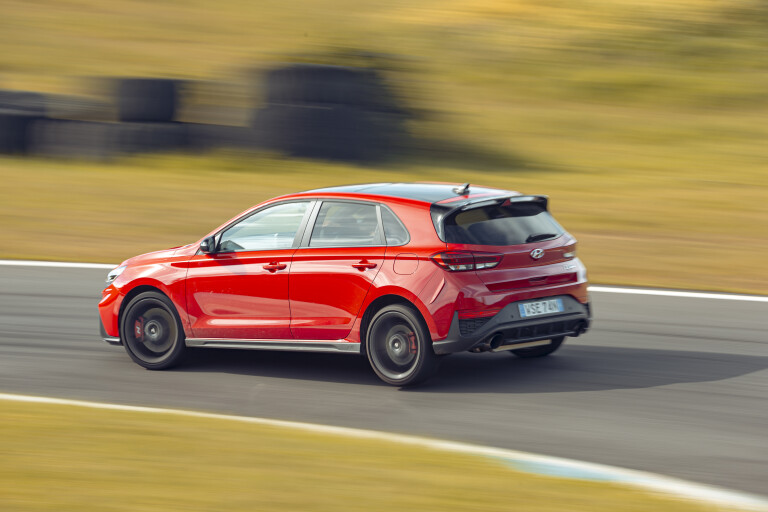
It also sounds incredibly angry, with a really hard-edged note and vicious cracks and bangs on the overrun. The eight-speed dual-clutch is a great match, though the six-speed manual is certainly no hardship either, with super quick shifts and well-chosen ratios. Purists will scoff, but you don’t really lose much in terms of involvement by choosing the dual-clutch.
That’s primarily because there’s plenty to concentrate on, even without shifting a lever around. The tyres need temperature, especially at the rear, with plenty of oversteer if you go charging into corners straight away but with a bit of warmth, the balance is primarily front-led but with just enough movement from the rear to help out.
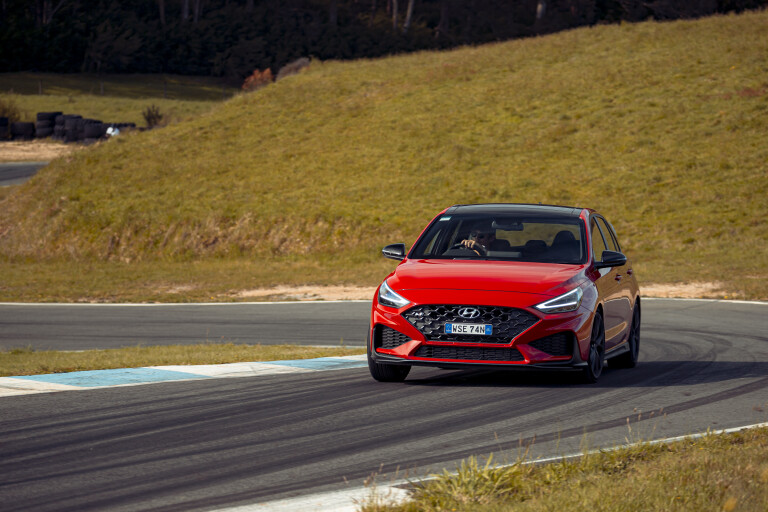
A word for the brakes. The specifications aren’t anything special, with plain old single-piston calipers front and rear, but they resist punishment remarkably well and provide great pedal feel.
Equally, there’s tremendous communication through – quite weighty – steering that allows you to finely judge the slip angle of the front tyres. There is some torque steer, and the limited-slip diff will drag both front wheels wide if you’re brutal with the throttle, but it also provides great traction.
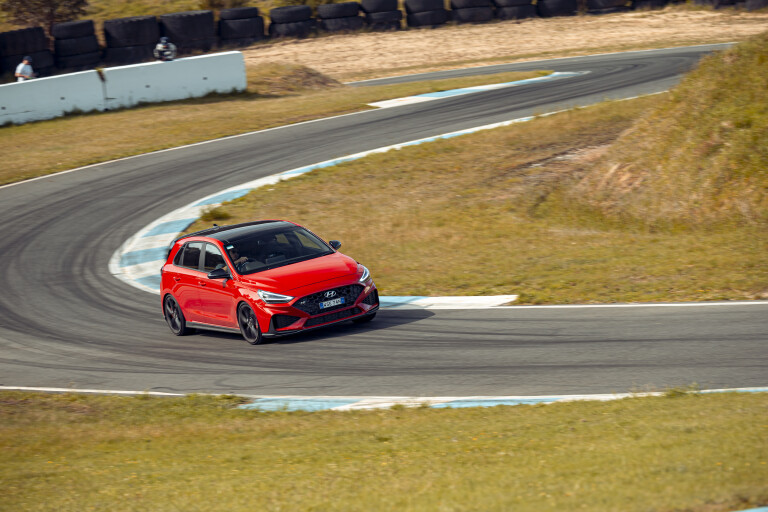
With a bit of right-foot sensitivity, adding throttle actually drags the nose into the apex rather than away from it thanks to the clever diff shuffling power to where it’s needed most. It makes a big difference in being able to commit to a corner and yet still get back on the accelerator.
All this has been happening in the standard N mode, activated by pressing the chequered flag button on the steering wheel, but pressing that button again activates N Custom mode (or holding it down deactivates the ESC completely).
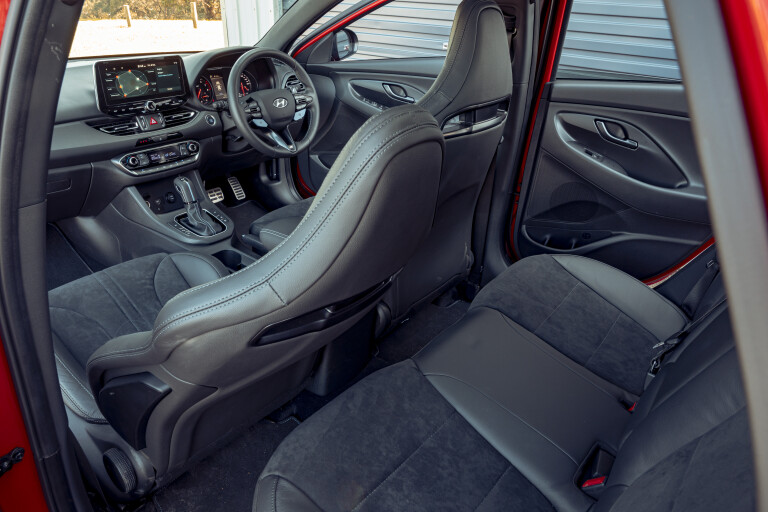
This mode allows the car’s various mechanical pieces to be altered individually through a spider-web-style screen in the centre console, where you’ll also find a lap timer and launch control. It’s more helpful on the road than on track, where having everything wicked up to maximum attack seems to be the way to go.
The only thing left to do is to attempt a lap time and it must be said that the i30 N’s 1:08.7sec isn’t quite as quick as I thought it might be. To be honest, it struggled slightly with front-end grip – the front tyres were possibly a little past their best – necessitating a slight delay when reapplying throttle.

Nevertheless, it’s a quick, incredibly capable and extremely entertaining hot hatch and one we can’t wait to unleash on a faster circuit.
Leaderboard
| RTR Ford Mustang: | 1:06.0sec |
|---|---|
| Audi RS5 Coupe: | 1:06.7sec |
| Lexus RC F Track Edition: | 1:06.8sec |
| Hyundai i30 N DCT | 1:08.7sec |
| MINI Cooper JCW: | 1:11.8sec |
2022 Hyundai i30 N DCT Specifications
| Body: | 5-door, 5-seat hatch |
|---|---|
| Drive: | front-wheel |
| Engine: | 1998cc inline-4cyl, DOHC, 16v, turbo |
| Bore/stroke: | 86.0 x 86.0mm |
| Compression: | 9.5:1 |
| Power: | 206kW @ 6000rpm |
| Torque: | 392Nm @ 2100-4700rpm |
| Weight: | 1466kg |
| Power/weight: | 141kW/tonne |
| Transmission: | 8-speed dual-clutch |
| Suspension: | Struts, coil springs, adaptive dampers, anti-roll bar (f); multi-links, coil springs, adaptive dampers, anti-roll bar (r) |
| L/W/H: | 4455/1795/1419mm |
| Wheelbase: | 2650mm |
| Tracks: | 1573/1564mm (f/r) |
| Steering: | Electrically assisted rack-and-pinion |
| Brakes: | 360mm ventilated discs, single-piston calipers (f); 314mm solid discs, single-piston calipers (r) |
| Wheels: | 19 x 8.0-inch (f/r) |
| Tyres: | 235/35 R19 (f/r); Pirelli P Zero HN |
| Price: | $52,000 + ORC |

COMMENTS